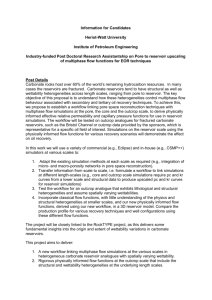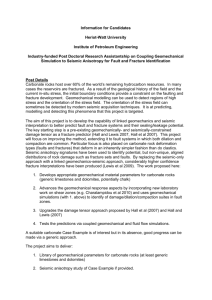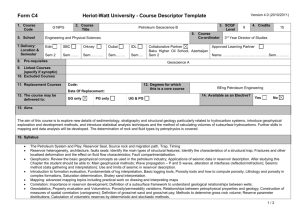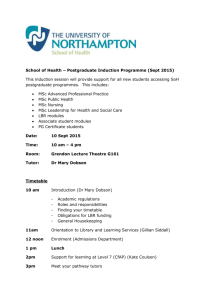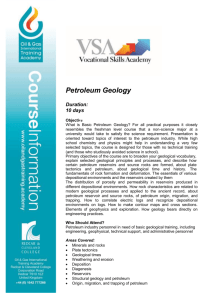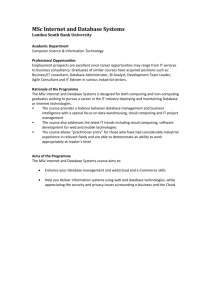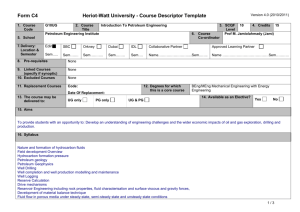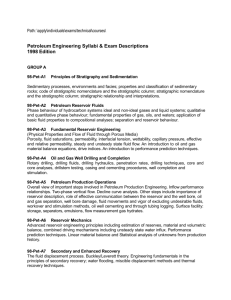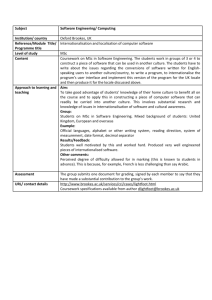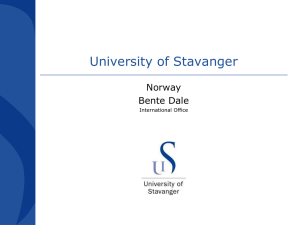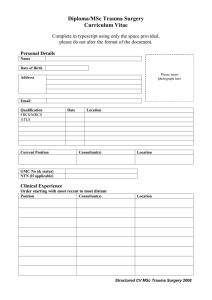Information for Candidates - Heriot
advertisement
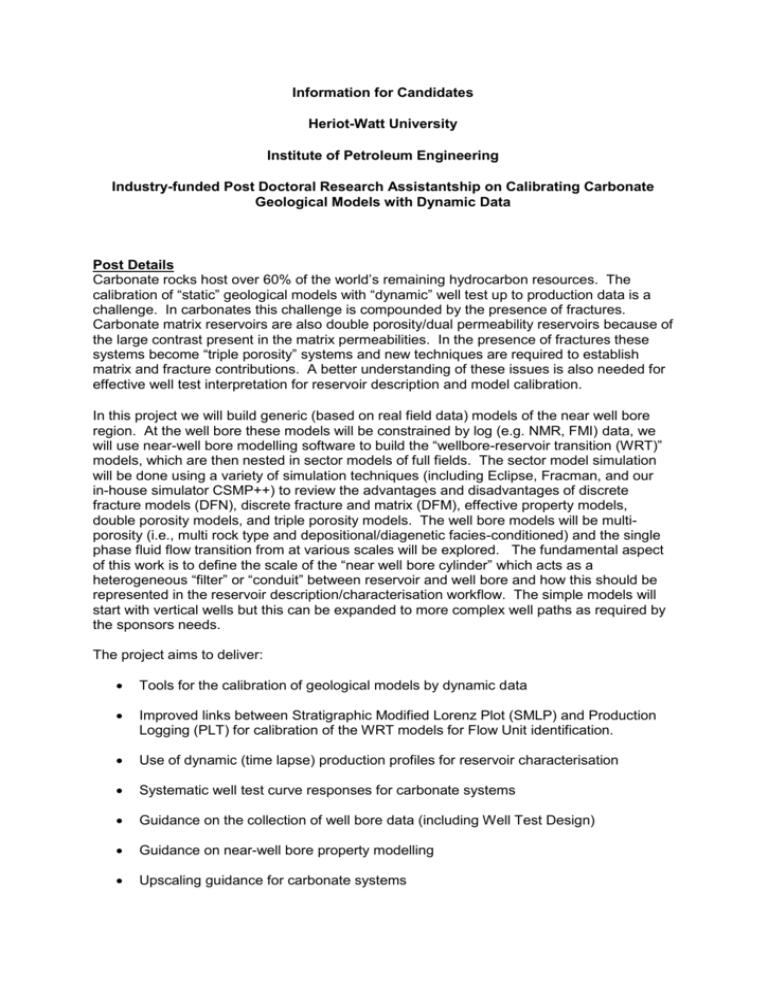
Information for Candidates Heriot-Watt University Institute of Petroleum Engineering Industry-funded Post Doctoral Research Assistantship on Calibrating Carbonate Geological Models with Dynamic Data Post Details Carbonate rocks host over 60% of the world’s remaining hydrocarbon resources. The calibration of “static” geological models with “dynamic” well test up to production data is a challenge. In carbonates this challenge is compounded by the presence of fractures. Carbonate matrix reservoirs are also double porosity/dual permeability reservoirs because of the large contrast present in the matrix permeabilities. In the presence of fractures these systems become “triple porosity” systems and new techniques are required to establish matrix and fracture contributions. A better understanding of these issues is also needed for effective well test interpretation for reservoir description and model calibration. In this project we will build generic (based on real field data) models of the near well bore region. At the well bore these models will be constrained by log (e.g. NMR, FMI) data, we will use near-well bore modelling software to build the “wellbore-reservoir transition (WRT)” models, which are then nested in sector models of full fields. The sector model simulation will be done using a variety of simulation techniques (including Eclipse, Fracman, and our in-house simulator CSMP++) to review the advantages and disadvantages of discrete fracture models (DFN), discrete fracture and matrix (DFM), effective property models, double porosity models, and triple porosity models. The well bore models will be multiporosity (i.e., multi rock type and depositional/diagenetic facies-conditioned) and the single phase fluid flow transition from at various scales will be explored. The fundamental aspect of this work is to define the scale of the “near well bore cylinder” which acts as a heterogeneous “filter” or “conduit” between reservoir and well bore and how this should be represented in the reservoir description/characterisation workflow. The simple models will start with vertical wells but this can be expanded to more complex well paths as required by the sponsors needs. The project aims to deliver: Tools for the calibration of geological models by dynamic data Improved links between Stratigraphic Modified Lorenz Plot (SMLP) and Production Logging (PLT) for calibration of the WRT models for Flow Unit identification. Use of dynamic (time lapse) production profiles for reservoir characterisation Systematic well test curve responses for carbonate systems Guidance on the collection of well bore data (including Well Test Design) Guidance on near-well bore property modelling Upscaling guidance for carbonate systems Further discussions on specific fields with sponsors will allow demonstration of these techniques in the setting of an oil field. Person Specification Qualifications and experience Essential A good first degree in a numerate science subject A PhD (or close to completion) in petroleum geology, hydrogeology, geophysics, physics, petroleum engineering, or related subject area Experience of geological modelling software (Petrel, GSLIB, IRAP, GoCAD, SBED, etc) Experience with flow simulation software (Eclipse, Stars, etc) Experience of Fortran, IDL or MATLAB programming and Linux/Unix Excellent communication, presentation and organisational skills. Ability to work independently and as a team member Good written and oral English language Desirable Experience of presenting scientific projects/concepts to a range of audiences Experience of programming Experience of modelling Informal enquiries Informal inquiries are welcome: please contact Prof Patrick Corbett (patrick.corbett@pet.hw.ac.uk, +44 131 451 3171). Heriot-Watt University For information about Heriot-Watt University in Edinburgh, please visit http://www.hw.ac.uk Institute of Petroleum Engineering For information about IPE at Heriot-Watt University, please visit http://www.pet.hw.ac.uk/ Petroleum Engineering at Heriot-Watt University was established in 1975 to satisfy the growing requirement for professional Petroleum Engineers as North Sea production rapidly expanded. The Institute is recognised as a world-leading institution in upstream oil and gas research. The funding of this position is through industry within the new International Centre for Carbonate Reservoirs established by Heriot-Watt University and Edinburgh University. For more information on ICCR go to http://www.geos.ed.ac.uk/iccr The position is primarily a research position but IPE currently has nearly 50 research staff and 80 PhD students, with ambition to grow these – including through the ICCR. The candidate will also get involved in interactions with the MSc student body and there are opportunities to develop teaching and mentoring skills. The Institute has a worldwide teaching footprint in Petroleum Engineering As a measure of our success, some 2,500 MSc graduates now work within the international oil industry. Industry played a key role in defining a 12-month programme, as exemplified by the MSc in Petroleum Engineering, MSc [PE], which is recognised as an important route into a career in the industry. The MSc [PE] programme attracts applications from more than 800-900 students annually, from which a class of about 90 is selected. A distance learning version of the MSc [PE] programme is also available, offering greater convenience and flexibility for students who prefer to remain in employment while undertaking a course of study. In addition, the MSc Petroleum Engineering course is now offered at the Dubai Campus. The MSc in Reservoir Evaluation and Management, MSc [REM], was developed from innovative research at Heriot-Watt and concentrates on the integration of geoscience and reservoir engineering, leading to better understanding and management of petroleum reservoirs. This course is popular with numerate graduates from the earth sciences and those with engineering backgrounds. About 150 applications are received annually and from these a class of 25 students is selected. More than 250 MSc [REM] graduates now work in the oil industry. A number of years ago, the MSc Petroleum Engineering by distance learning was launched. The content, exams and degree are identical to the residential Petroleum Engineering course, but this option allows individuals to study for a recognised degree during their professional careers. An Approved Learning Partner (ALP), was established at Tomsk Polytechnic University, Siberia, and approximately 50 students are now studying there for our MSc in Petroleum Engineering and 20-25 students are studying for our MSc in Reservoir Evaluation and Management. In 2005, the MSc in Geoscience for Subsurface Exploration Appraisal and Development (GeoSEAD) was launched in conjunction with the Universities of Edinburgh and Newcastle Upon-Tyne and this is a further vehicle for participation of ICCR research staff in the taught courses. Terms of employment The position is available for 24 months. Salary: Grade 6/7, £23,566 - £35,646 Application Procedure: Apply online at http://www.hw.ac.uk/hr/v_index.php Please quote reference number 155/10. Closing date 15 October 2010 Interviews late October/early November. The University reserves the right to vary the candidate information or make no appointment at all. Neither in part, nor in whole does this information form part of any contract between the University and any individual.
